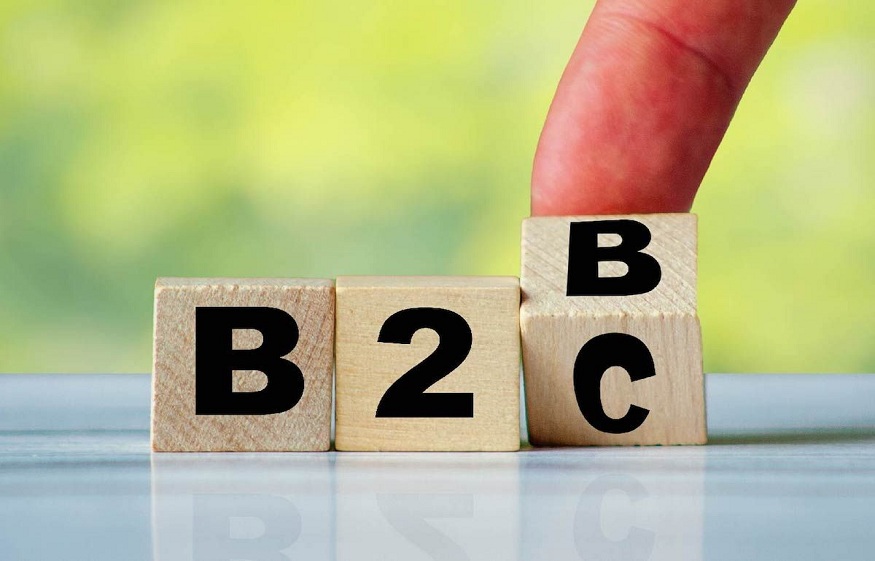According to Nasdaq, 95% of the purchases will be made from eCommerce by 2040. The future of eCommerce is bright and in upcoming years the trend of eCommerce platforms is going to rise at an impressive rate.
A report by Statista states that global eCommerce retail sales will reach 7.5 trillion dollars by 2025. As you see, this is the right time for you if you are planning to develop an eCommerce platform.
But, deciding whether you choose B2B or B2C platforms is confusing and time-consuming. As one of the leading B2C eCommerce platform development companies, we bring this detailed article on a comparison between B2B and B2C eCommerce platforms. Let’s get started.
Let’s first understand the meaning of B2B and B2C eCommerce platforms.
What Does Mean by B2B and B2C eCommerce Platform?
A business operating and selling its products directly to the end-users is called a B2C eCommerce platform.
A business operating and selling its products/services to other companies is called a B2B eCommerce platform.
As you see, both the eCommerce platforms are completely different from each other. But, the similarity is the business process on eCommerce platforms.
5 Core Differences Between B2B and B2C eCommerce Platforms
In the following, we will look at the 7 core differences between a B2C and B2B eCommerce. Also, you will learn about the buying process, marketing, decision-making, and customer lifecycle of both platforms.
1. Customer Lifecycle
The customer lifecycle of B2B and B2C eCommerce is quite similar as it shares some characteristics. To sell products whether, on B2B or B2C eCommerce platform, you have to be aware of users about products, generate interest, and guide customers to take action on your platform.
Both the platform’s business process is similar as users are going to visit your website and browse the products of their interest and make a purchase if it’s right for them and ranges within their budget.
The only difference here in B2B and B2C eCommerce platforms is the purchase amount based on the leads. As B2B eCommerce purchases are likely to be larger in terms of Average Order Value, therefore, eCommerce stores are going to invest more in marketing, sales, and customer support.
2. Marketing Strategies and Principals
The marketing strategies of both platforms are different. B2B businesses create marketing strategies that attract businesses that serve different businesses. Whereas, B2C eCommerce companies focus on creating strategies for the individual buyers and the needs of individual buyers.
While creating marketing strategies, focus on the needs and decision-making process of customers. As the eCommerce platform funnel is the same for both platforms, you need to follow the same but create a strategy according to your type of eCommerce platform.
Here is the funnel to market your eCommerce platform.
- Awareness
- Interest
- Consideration
- Intent
- Eval
- Buy
First, you need to create awareness, build interest, increase consideration, address intent, evaluate, and buy.
So, based on your eCommerce platform, you need to create a marketing strategy according to this funnel for sales. When you hire a B2C eCommerce developer to create your store, parallelly you can also create separate marketing panels within your admin panel.
3. Assuring Your Customers with Proof
Whether you are running a B2B or B2C eCommerce company, one of the considerations is assuring users of your business. As said, the Average Order Value of B2B eCommerce is larger, so here you need to provide strong assurance to your customers. Therefore, while writing your product description pages, you need to provide social proof. So, you can convince a person to make a purchase accordingly.
Let’s take an example, if you check the websites like Alibaba for B2B, you will see detailed product descriptions pages for each product. The companies selling the product on the platform will be providing detailed information about the products. In addition, you will have authentic images of products. Plus, you will be able to contact the seller directly from the platform.
And, the last B2B eCommerce platform is they provide customer support for contact or queries purposes. On the other hand, you won’t see an Amazon-like website that will be providing individual contact seller support because it’s too costly for them.
So, B2C eCommerce platforms provide the same level of assurance as the established B2C websites provide to their customers. With different things like product description, reviews and ratings, and verified batches on products.
4. Decision Taking and Purchasing Objective
This difference plays a major role in both the eCommerce platforms B2B and B2C. The purchasing control in B2B eCommerce involves several high authorities like the CEO, stakeholders, and executives. Whereas, in B2C eCommerce it totally depends on individual users based on their needs.
In addition, being a B2C customer, you make purchases of dozens of items. But, the amount of those items is small compared to purchases made in the B2B eCommerce platforms. In addition, the B2C eCommerce process is less formalized as said the decision-making is on an individual person.
Whereas, the B2B eCommerce buying process is different because it is more structured and involves multiple authorities. Therefore, before any purchase happens on B2B eCommerce, it is carried out with research, data, logic, budget, and based on business objectives. In addition, the B2B buyers exactly have clear requirements regarding what they want and what they are looking for while making any purchases.
Remember that business purchases the products for their business, and it is not a one-time process. If you are able to make a long-term relationship with your B2B customers, then they are surely going to re-order with special pricing. For that, you should have a simplified and easy re-order system.
5. Volume of Transactions
According to the report, the global B2B eCommerce market growth will reach $33 thousand billion by 2030. The B2B market is going to grow at 19.7 CAGR from 2022 to 2030. Imagine the growth of B2B eCommerce in the upcoming years and how rapidly the industry will grow. Whereas, the B2C eCommerce market scope will reach $7600 billion by 2028. As you see in both the reports, the B2B market is much larger than B2C.
It is because B2B is a large industry and has a very much larger average order value. On top of that, businesses purchase the products in bulk at scale and sell them to their customers. It is estimated that the average order value of B2B is seven to eight times higher than B2C. For example, the interior design services for a business can cost very much higher. Whereas, the same service can cost less for a small house.
Conclusion
Both the eCommerce platforms (B2B and B2C) have many differences as you saw above in the blog. Regardless, whichever eCommerce platform you build for your business, you will earn decent money if you follow the correct steps of eCommerce business by making good strategies. It involves hiring an eCommerce developer to list a product on your platform.
So, it totally depends on you whether you want to build a B2B or B2C eCommerce platform for your business. Still, if you are confused about making a decision, get in touch with our eCommerce web professional. We will guide and help you take an effective decision by understanding your requirements. Let’s connect over a call.









